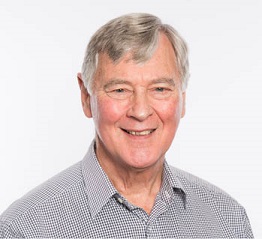Associate Professor Doug Brown AM
At the end of 2024, Associate Professor Doug Brown AM retired from the SRI Board.
Doug has worked in the spinal cord injury field for almost 40 years, since he was appointed as Director of the Spinal Injuries Unit at the Austin Hospital (now the Victorian Spinal Cord Service, Austin Health) in 1982. Over this time, Doug has made significant contributions to spinal cord injury treatment, care and research, both nationally and internationally.
Doug’s involvement in a range of research projects has contributed to advances in the management of spinal cord injury and its associated health complications, including early management of the acutely injured person, male fertility after spinal cord injury, and psycho-social aspects of spinal cord injury. In the 1990s, as part of a 5-country multi-centre study, Doug worked on the introduction to Australia of tendon transfer surgery and functional electrical stimulation for the restoration of hand function in people with quadriplegia.
In the early 2000s Doug supervised the PhD of Prof David Berlowitz, Austin Health, which discovered that sleep apnoea is a direct consequence of spinal cord injury. Subsequently, from 2009-2014 Doug was a Chief Investigator on David’s four-country multi-centre study on sleep health in quadriplegia. This research determined that the use of continuous positive airway pressure (CPAP) significantly improves daytime functioning and quality of life for people with quadriplegia.
Doug was also one of the first physicians to acknowledge the critical role of psychology in the spinal cord injury rehabilitation process. He established a transitional team, comprising psychiatrists, psychologists and social workers, to manage the psychological rehabilitation of spinal cord injury patients and their transition from the rehabilitation hospital to home and into their community. This was one of the first such services in the world, and Doug and his team published the initial group of papers on its implementation as a guide for other spinal cord injury units internationally.
As a measure of Doug’s leadership in the field, after the 1988 Armenian earthquake, he was seconded to the Red Cross for three months to help establish a spinal cord injury service in Yerevan, the capital. Doug led the team for three months, managing a program of training for Armenian doctors, nurses and therapists, and helping plan a new spinal unit. This spinal cord injury service was the first in the USSR and set a precedent for other units established in the Commonwealth of Independent States, post-Soviet era.
Doug is incredibly generous with his time and served for many years in a voluntary capacity with the International Spinal Cord Society (ISCoS), the peak international professional society promoting excellence in spinal cord injury care, education and research.
Doug was Associate Editor of ‘Spinal Cord’ (the official journal of ISCoS) from 1986-2011, he chaired the ISCoS Prevention Committee from 2006-2012 and was the President of ISCoS from 2012-2014. He chaired the Organising Committee for the Australia & New Zealand Spinal Cord Society Annual Scientific Meetings in 2000, 2006 and 2012. Doug was made a Fellow of ISCoS in 1998, and in 2009 received the ISCoS Society Medal, its highest honour, awarded for “outstanding contribution to the prevention or treatment of spinal cord injury or to research related to spinal cord injury.”
Doug retired from the Directorship of the Victorian Spinal Cord Service in 2012, however his passion for the field of spinal cord injury continued. In 2011 Doug had co-founded the Spinal Research Institute. During Doug’s 30 years of clinical care and research he recognised that research translation – from clinical trial to adoption in policy and clinical practice – was typically only achieved through multi-centre studies. Doug founded the SRI on the knowledge that collaborative research, spanning multiple centres, is necessary to bring about the translational research outcomes that will change healthcare policy and practice, and improve the health and quality of life of people with spinal cord injury. Doug was also passionate about supporting early career researchers, to attract and retain them in the spinal cord injury field, and recognised a particular need to support those from low-resourced regions and countries. Further, Doug understood the importance of involving people with lived experience of spinal cord injury as active partners – not only as study participants – in the research process. These principles are embedded in the SRI’s programs and key pillars of support today – research collaboration, early careers researchers, and consumer engagement.
In 2021 Doug was made a Member of the Order of Australia (AM) in recognition for his significant service to medicine, particularly to spinal cord injuries. Doug has created an enduring legacy with the SRI, which will carry his vision and impact into the future.

